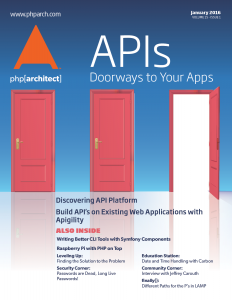Discovering API Platform
API Platform is an open-source PHP web framework focusing on web API development (yeah, the name is pretty explicit). It is built on top of the famous Symfony full-stack framework and is 100% compliant with it: you can install any Symfony bundle and you can add API Platform to existing Symfony projects. In this article, you will learn how to use API Platform together with some Symfony bundles to create a small but fully featured API, by leveraging its basic features. This API, built step by step, will be a customer and prospect directory. by Kévin Dunglas
Build API’s on Existing Web Applications with Apigility
Apigility is an API Builder, designed to simplify creating and maintaining useful, easy to consume, and well-structured APIs. Regardless of your experience in API-building, with Apigility you can build APIs that enable mobile apps, developer communities, and any other consumer-controlled access to your applications. by Michelangelo van Dam
Writing Better CLI Tools with Symfony Components
Symfony is awesome! Why? Because it is a “set of [decoupled,] reusable components.” When these components work together as a cohesive unit, they become applications that are easy to maintain and extend. By using Symfony components, you can quickly create great applications without having to bootstrap an entire framework. In this article, we will learn to use some components to empower you to write better applications faster—starting with the Symfony Console. by Juan Manuel Torres
Raspberry Pi with PHP on Top
The Raspberry Pi 2 Model B is the newest form of Raspberry Pi Foundation’s “credit card-sized computer” that is most commonly used for learning the ways of the programmer. But don’t be too quick to dismiss it based on size, because this miniature machine can be used for more than just <?php echo 'Hello World!';. Let’s talk about how to make the most of the Raspberry Pi 2’s power and create a PHP web server. by Dylan Intorf
Education Station: Date and Time Handling with Carbon
To start off the year, I want to talk about dates. No, not the very tasty and sugary fruit. Dates, as in days, years, months, weekends, and so on. You know, the kind that, despite having had to work with them since we were all kids, we can still find challenging. If you’ve been working with any semi-recent version of PHP, you’ll have used its excellent DateTime extension. With it, we can do all kinds of date calculations, as well as handle for time zones, intervals, and formatting. Carbon extends PHP’s DateTime extension making object creation, comparison, printing, modification, addition, and subtraction a lot easier. by Matthew Setter
Leveling Up: Finding the Solution to the Problem
As software developers or engineers, our job is not to write code. In fact, we should be writing as little code as we can. Every line of code we write is a liability: a potential security hole, a new bug, a tight coupling that makes future modifications difficult or impossible. It may surprise you to realize that writing code isn’t even what your job is about. by David Stockton
Community Corner: Interview with Jeffrey Carouth
We speak with Jeffrey Carouth, host of the Loosely Coupled podcast and Dev Book Club and see how he got started, why he runs those projects, and how to deal with CfP rejections. by Joe Devon
Security Corner: Passwords are Dead, Long Live Passwords!
Read this article for FREE
Anyone who’s been around web applications (or really any applications) that need to protect data or restrict access to only a certain group of users has experience with passwords. They’re a de facto standard when it comes to protecting applications. Along with usernames (or email addresses, depending on the system), they’re used to identify the end user and verify that they are who they claim to be. Unfortunately, there are many things wrong with them that make them one of the worst options in application protection. There are whole industries around removing or reinforcing passwords in applications, yet they’re still a huge part of the security of most services out there. by Chris Cornutt
Different Paths for the P’s in LAMP
The “P” in Lamp can stand for PHP, Python, or Perl. Now that PHP 7 has been released, let’s see how other languages have fared with their next major version. by Eli White





